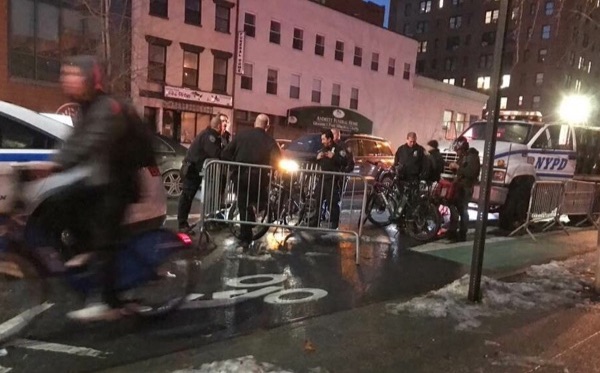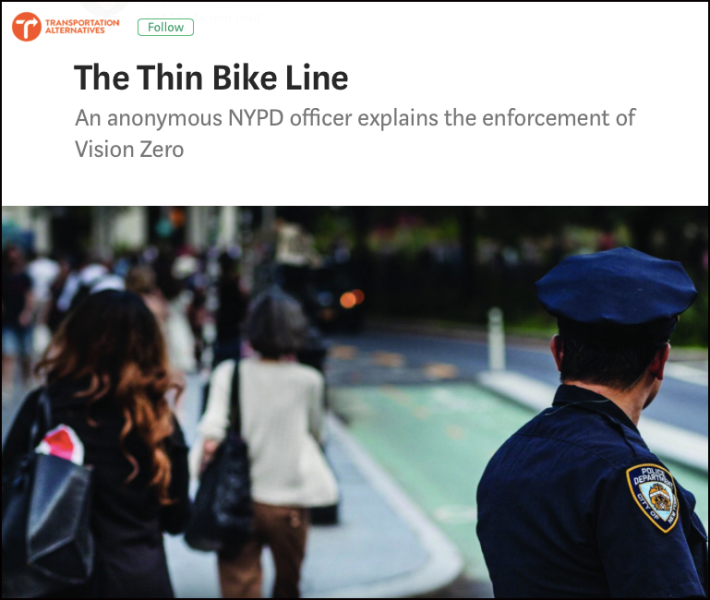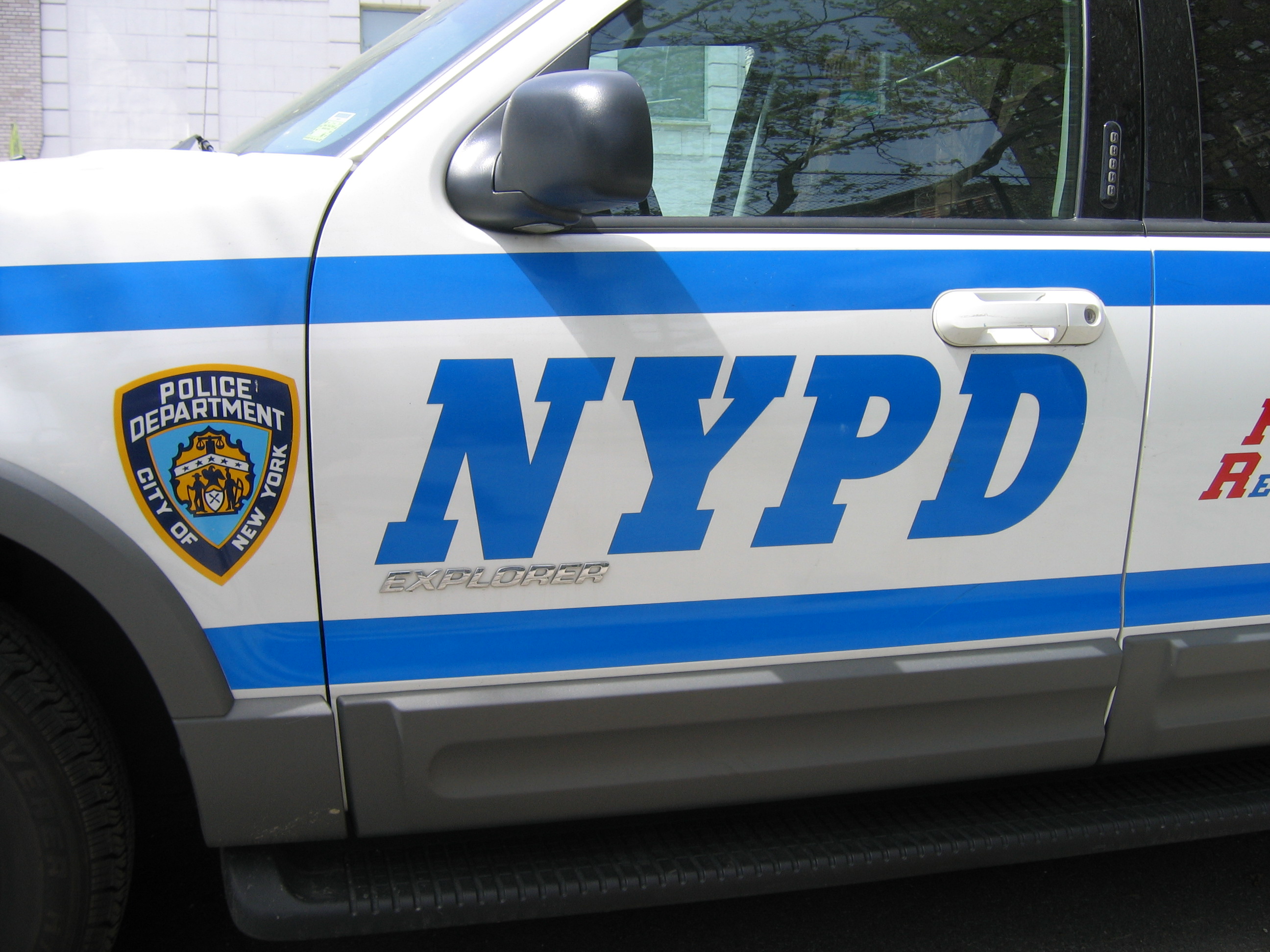Even the seemingly best cops are xenophobic, vaguely racist drones who don't really care about cyclists.
That's not me talking. It's a cop.
In an astounding interview this month, Transportation Alternatives' twice-yearly magazine Reclaim got a veteran police officer to reveal dirty secrets about the NYPD's war on cyclists and its protection of drivers who have killed.
And his insights are jaw-dropping. At various points, this self-proclaimed cyclist cop blasted his fellow officers' "incompetence" and "bias." And he called for more protected bike lanes! And he supports Vision Zero!
But before readers could see him as one of the good guys, this officer, who declined to reveal his name, also defended the rank-and-file's opposition to life-saving speed cameras. And he perpetuated the false, statistic-free argument that e-bikes are causing injuries to pedestrians.
And then the cop made even bigger news with what was not printed by Reclaim Editor Jessie Singer. During the conversation, he demeaned immigrants and suggested that they commit crimes at a greater rate than other Americans.
"This marks the first time that we have edited an interview to remove content — in particular, counterfactual claims about undocumented immigrants," Singer wrote in a long editor's note. "When asked about the e-bike crackdown, the officer justified the enforcement with falsehoods about bearing of immigration status on tax-paying, and blaming immigrants for job availability, wage undercutting, and criminal activity. We have chosen to not give column inches to these erroneous and xenophobic statements."
Singer declined to comment further. I reached out to the NYPD and City Hall to see if either Police Chief James O'Neill or Mayor de Blasio share the cop's unpublishable anti-immigrant racism. O'Neill didn't bite (see update below), but de Blasio spokesman Seth Stein did.

"New York City is the safest big city in the country while we are home to our largest share of immigrant New Yorkers in over a century," Stein said. "That’s thanks in part to the trust we’ve built and strengthened between local law enforcement and immigrant communities.
"Our city policies are grounded in reality, and research tells us that immigrants commit fewer crimes than the general population. Any claim to the contrary is demonstrably false."
Stein did not respond when I followed up: Don't we have a pretty big problem, I asked, when a police officer believes something that is "demonstrably false"? And doesn't his apparently racist and definitely xenophobic rant undermine everything else he said in the interview?

Indeed, Singer's editor's note again sounded the alarm that even an officer who described himself as a cyclist is part of a larger machine that does not care about what cyclists and pedestrians experience every day.
I have been a reporter in New York City for more than 25 years and to this day, the single greatest challenge is to get a police officer to talk, let alone say anything.
Transportation Alternatives certainly got a cop to say something.
For instance, the officer admitted that his fellow cops can't distinguish between the danger caused by a rogue taxi driver and a cyclist.
"The only bias that I do hear will be 'those bicyclists' types of general statements, the same for taxis," the cop said in the interview. "You'll hear cops say, 'Oh, look, those f-ing cabs are always stopping in the crosswalks. ... You hear a million things about cabs and what they do. The same things will be said about bicyclists."
Singer asked the cop why the NYPD routinely blames cyclists for their deaths, often leaking anti-cyclist information to the press even before a full investigation has been completed and reflexively relying on driver testimony. His answer was unsatisfying.
"Several reasons," the cop said. "Incompetence is the main one. Incompetence in not canvassing and interviewing witnesses, in not carefully interviewing the participants of the crash to get a full understanding of what happened and in not being very skeptical of all statements.
"I can't envision a scenario where a leak to the press after a crash is meant to have a nefarious agenda," he added. "Incompetence — that I can easily see."
Just as discomfiting, the officer defended his colleagues' opposition to speed cameras for the worst reasons: the tickets are harder to fight (hey, isn't that a good thing?) and because the school-zone cameras only help people with kids (hey, isn't that a good thing, too?).
"Regular police officers ... are more often than not against [the cameras] simply because it is like Big Brother looking over your shoulder, and there is no recourse if you get caught," he said. "Americans in general ... are probably not a huge fan of enforcement cameras unless they themselves are the beneficiary of the enforcement, either because they have children in that school or because it's located on a block near where they live or work."
Speed cameras in just 140 school zones caught more than 4.5 million speeders in their first five years — and more than 80 percent of speeders do not get a second ticket, data that proves their success.
But the officer admitted that the NYPD's traffic enforcement is not scientific or data-driven, even though cops and the Department of Transportation know exactly where the crashes are happening.
"The majority of traffic enforcement ... is based on complaints," he said, adding that the only way to get change is for the public to agitate for it. And that's a hard road.
"If you want to be specific as to a certain [dangerous] intersection or roadway, then you would have to reach out directly to the precinct, preferably in written communication," he advises. "Email, letters and be forceful with it. One is not enough. Keep up the pressure."
The cop also pulled away the veil of secrecy about some police operations. For instance, he explained why officers suddenly start writing summonses to cyclists even if a cyclist has been run over and killed by a driver. It's part of a policy called the "72-hour plan" that has been rarely aired in public.
"Any time there's a fatality, whether it involves a bicycle or not ... there's something called a '72-hour plan' enacted," the officer revealed. "Enforcement is stepped up for all moving violations. ... The rational for the 72-hour plan, I'm guessing, is that they figure anytime someone dies, because it's a serious thing, they focus on that area to see what people were doing wrong there to prevent another fatality."
Singer gently suggested that there might be a better way than just randomly ticketing cyclists. The cop agreed.
"Better direction has to be received from the supervisors at the precinct level and at the borough level ... to say that there are certain violations that they're looking for and certain violations that they're not looking for," he said.
Was there any good news in the interview? Actually, yes.
The officer came out in strong support for better street design, including protected bike lanes, which he called "a huge improvement from regular bicycle lanes."
"I'd like to see even more of them throughout the city," he said.
And he said that before Vision Zero, "there wasn't a whole lot of direction" on traffic enforcement."
"Now," the cop added, "the precinct and even the patrol boroughs are pushing traffic violations that are consider Vision Zero violations, such as running through red lights, failure to yield to pedestrians. disobeying signs and improper turns."
But despite a few bright spots, Singer's article concluded that the conversation disturbed her so much that she was left "wondering if police enforcement should be an element of Vision Zero at all."
Is there any doubt?
After this story was published, NYPD Lieutenant John Grimpel said, The NYPD enforces the law impartially and does not make arrests or summons individuals based on their immigration status." For the record, I had asked these questions:
- Does the NYPD have a comment about this officer’s apparent racism and stated xenophobia?
- Can the NYPD assure the public that its e-bike crackdown — and other enforcement efforts — are handled on a race- or national-origin-blind manner?
- Does the NYPD share the officer’s apparent belief that immigrants are more likely to commit crimes than non-immigrants?
Gersh Kuntzman is editor-in-chief of Streetsblog. He writes his periodic "Cycle of Rage" column when he gets angry. They are all archived here.







